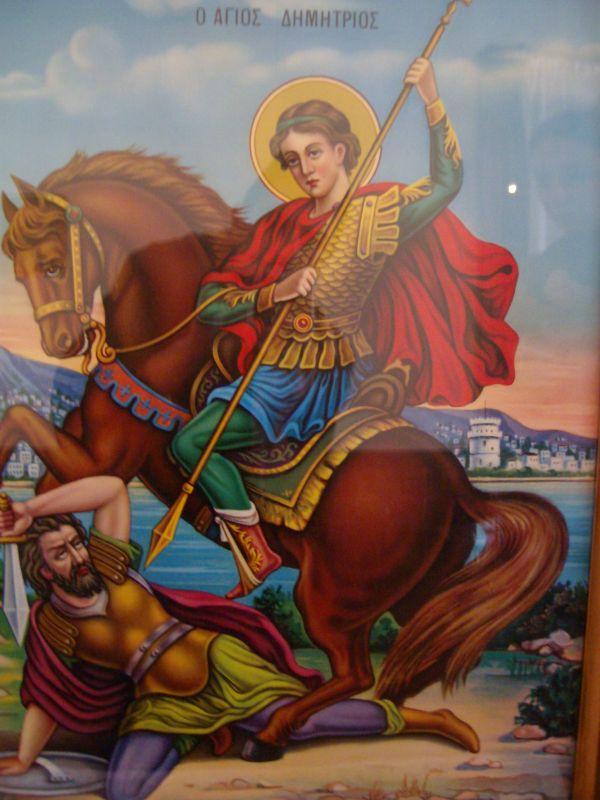If the moon was full on Dimitrovden - the feast of Saint Demetrius (Saint Dimitar in Bulgarian), celebrated each year on October 26, hives would be full of honey. This is one of the numbers of divinations performed on this day. On this day people also tried to tell what the winter would be or whether the year would be successful. One of the Christian biggest feasts, Dimitrovden is also linked to a number of ancient customs, showing how pagan folk rituals in the past were given new Christian meaning. We are to tell you about some of these customs during today’s Folk Studio by Albena Bezovska.
 Bulgarians call the whole month of October “Dimitrovski,” which means it belongs to St. Demetrius. In the past all hired workers received salaries on this day and they celebrated the end of the summer work. That is why the day is sometimes called “Razpust,” meaning letting go. In the past workers used to be hired on May 6th - St. George’s Day and their work ended on October 26th. There were people who used to hire workers for whole year – from Dimitrovden to the next Dimitrovden. If one agreed they could not leave and that is why people hoped their employer would be a good and generous person. That is also why old people say some are freed on Dimitrovden, while other become slaves.
Bulgarians call the whole month of October “Dimitrovski,” which means it belongs to St. Demetrius. In the past all hired workers received salaries on this day and they celebrated the end of the summer work. That is why the day is sometimes called “Razpust,” meaning letting go. In the past workers used to be hired on May 6th - St. George’s Day and their work ended on October 26th. There were people who used to hire workers for whole year – from Dimitrovden to the next Dimitrovden. If one agreed they could not leave and that is why people hoped their employer would be a good and generous person. That is also why old people say some are freed on Dimitrovden, while other become slaves.
According to folk beliefs, St. George and Saint Demetrius are twin brother. Their feasts mark important transitions. St. George brings the summer months and winter comes with Saint Demetrius. It is said that in the night of Dimitrovden the sky opens and the saint becomes patron of the snow and cold. He shakes his white beard and snows starts falling.
One of the divinations related to the nature of winter was performed with the help of cows. It may sound strange for the modern people but in the past people took a cow outside and waited for the animal to lick some part of its body. This way they could say which will be the coldest months of winter, depending on which part of its body the cow licks.
During the month of Saint Demetrius village feasts are organized. There is a custom popular in southeastern Bulgaria where on Monday before Petkovden (October 14), a village feast was organized but only the senior members of the community took part in it. In the same region a custom called “Kokosha Tsurkva” (Hen’s Church) exists. The housewives in the village used to cook hens in a big cauldron and then the whole village gathered at a special place near an old church or consecrated ground to have a feast. Before starting to eat, women gave bread to everyone, thus celebrating the spirit of God.Dimitrovden is one of the biggest Christian feasts in Orthodox Bulgaria. People bearing the names of Dimitar, Dimitrina, Dimo, Mitra, etc., celebrate on this day. Feasts and festivals are organized in a number of towns and villages across the country. According to traditions, dishes with ram meat or rooster meat are served if the one who celebrates is a man. Hen meat dishes are served if a woman celebrates her name day. Roasted pumpkin or apples and apple pie are also consumed.
English: Alexander Markov
Early in the morning, young men and women gather in the meadows to play with the sun. "It is believed that the sun dances and shimmers on Enyovden at sunrise, because it is the longest solstice of the year". This is the most important thing to know about..
Today is Bulgarian Folklore Day, designated as such by the Ministry of Culture in 2019. The idea for such a day belongs to Chinary folklore ensemble, with the support of the Mystery of the Bulgarian Voices , percussionist Stoyan..
On June 3 at 18.00 in Art Gallery "Circle" in Kardzhali the photo exhibition "Ethnopalitra - the faces of Balkan folklore" will be opened. The exhibition is the work of journalist and historian Georgi Kulov. The exhibition is inspired..

+359 2 9336 661
